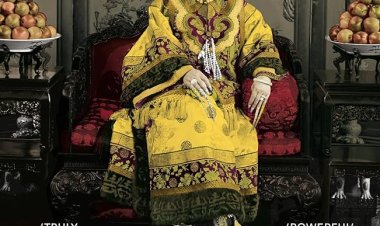Book Review: Empress Dowager Cixi: The Concubine Who Launched Modern China By Jung Chang

Book Review
By Mehak Johari
History has witnessed numerous good leaders, however, occasionally comes a leader who leaves behind a legacy that profoundly reshapes the destiny of a nation. Empress Dowager Cixi, the subject of Jung Chang’s book, “Empress Dowager Cixi: The Concubine Who Launched Modern China”, was one such remarkable figure in Chinese history. As the name of the book suggests, she was behind the reforms that modernised China, setting the foundation for the power it is today. From her initial induction into the palace as a mere concubine, the meticulously researched biography unfolds the pivotal moments of Cixi’s life, capturing her journey as the woman who reformed China from behind a yellow silk screen. I was awed by the stellar character of this woman who made an honest effort to understand the needs of her people and shaped an empire that evolved with the advent of time. She welcomed criticism and embraced change. Her wit and intelligence enabled her to not only secure a powerful position for her empire but also for herself within the palace walls. This book gives us a glimpse into how Cixi managed to design everything independently – from her intricate silk robes to the complex institutional framework upon which present-day China relies.
Empress Cixi was raised in a family that always valued her opinion. This gave her the confidence and self-assurance in her capabilities that would prove vital in running an empire. She was inducted into the Emperor Xianfeng’s court as a lowly concubine. However, she moved up the ranks gradually when she gave birth to the heir of the Qing Dynasty, Zaichun. The book discusses multiple events in the history of the Qing Dynasty that culminated in Cixi assuming power of the massive Qing Empire. Jung Chang talks about the closed-door policy assumed by Emperor Xianfeng and his conservative advisors which led to the Opium Wars and brought havoc in the empire. Before Xianfeng’s death, he had left a group of Regents in-charge of the kingdom. However, they were the same officials who were responsible for the chaos that had dawned upon the empire. Thus, Cixi, along with Empress Zhen, led a secret coup against the Regents to take over the control of the throne on behalf of their son, Emperor Tongzhi, who was too young to assume the duties of the throne. The book highlights a unique aspect of history, the friendship and political partnership of the two empresses. When Cixi assumed power, her open-door policies appeased the foreigners, restored peace in the empire and established a new source of revenue from foreign trade. Consolidating power in the traditional and conservative Qing Empire could not have been easy for a woman and this book informs us of Cixi’s allies like Empress Zhen, Prince Gong, Earl Li, Robert Hart, and others who aided Cixi in the development of the empire. Jung Chang gives us an informative peak into the lives of those living in the Forbidden City around that time. We get a glimpse into the domestic decision-making policies during the Taiping revolution, the Opium Wars, the modernisation reforms, war with the French, the death of Cixi’s son (Emperor Tongzhi), war with Japan, the attempted assassination of Cixi by her adopted son (Emperor Guangxu), the Boxer Rebellion and many other small but impactful incidents that have shaped China’s destiny.
The book uses a myriad of sources but relies primarily on Chinese historical documents like imperial decrees, court records, official communications, personal correspondence amongst Chinese officials and with foreign leaders, diary entries (like that of Grand Tutor Weng), and eye-witness accounts. Such a vast repository of sources makes this biography a reliable account of Empress Cixi’s life.
Against popular belief that Empress Cixi was a merciless and despicable ruler, Jung Chang succeeds in highlighting other aspects of her personality that made her an unforgettable and admirable leader. Jung Chang has painted Cixi as a rational, strong-willed, feminist, and farsighted leader. Cixi made sure to always consult her advisors on all matters, even if it meant weighing their opinions against her personal beliefs. She was strong-willed and didn’t flinch in the face of danger and uncertainty. She treated the foreigners with kindness and had even trusted Robert Hart, a foreigner, with managing the Customs service of China. She was a devout feminist, banning the horrendous practice of foot binding among women and even encouraged modern education for them. Her kindness wasn’t restricted to the westerners, evident by her abolishment of gruesome punishments like ‘death by a thousand cuts’. She was far-sighted in her policies and sent Chinese diplomats abroad to study western institutions with the aim of reforming the Chinese systems. When dealing with the French, she had the acumen to stop the war at the right moment. She valued peace over territory and, thus, let go of Vietnam (Chinese vassal state) to the French if it promised a secure border with France. She brought a myriad of reforms to the empire like expansion of foreign trade, and introduction of coal mining, telegraph, and electricity. Despite her initial hesitation about railways, she agreed to it for the sake of boosting trade. Charles Denby, the American Minister to Beijing wrote about Cixi, “to her own people, she was kind and merciful, and to foreigners she was just”.
The book doesn’t just paint a glorified picture of Cixi but also highlights her shortcomings and mistakes. Cixi siphoned-off vast sums of state money to re-build her beloved Old Summer Palace. During the Boxer Rebellion, the Empress Dowager had initially supported them believing that this would prevent the foreign powers from advancing into China, however, her judgement grossly backfired and led to a humiliating defeat for China. The book attempts to bust a lot of myths, assumptions, and rumours about her, one such being an alleged attempt by Cixi to poison Empress Zhen and her son to assume complete power when there is no evidence to support this hypothesis.
The language used by Jung Chang is easy to understand and her use of footnotes to further elaborate on certain events, gave this book a good flow. Given how much detail this book contains on the history of the Empress and her empire, it could be a bit difficult to understand for those who are not well-versed with the highlights of Chinese history. However, I would recommend this book to anyone who has an interest in learning about the person who gave shape to the embryo of modern China. I would rate this book a 10/10 because of the tremendous job done by the author in recounting the events of the time and making it such an exemplary read.
Disclaimer: The book review is the author’s individual scholastic articulation.























